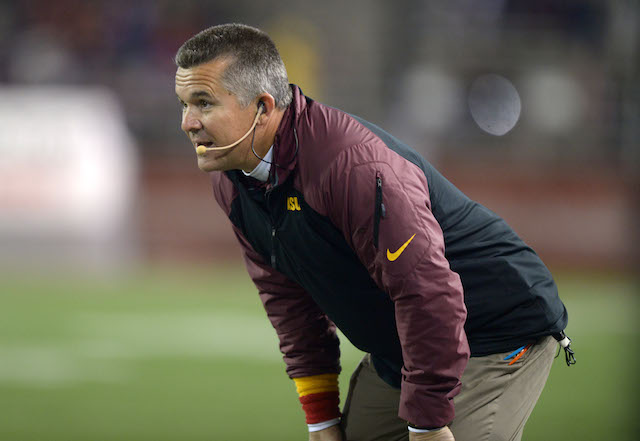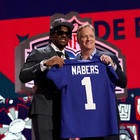
More college football: Jon Solomon | Dennis Dodd | Latest news
This summer, for the first time, active college football players can receive payment to work their schools' summer camps, thanks to newly enacted NCAA legislation.
The NCAA is allowing schools to pay current student-athletes a figure consistent with the going rate for guest coaches, which fluctuates but can command close to $20 per hour depending on the school.
The players are employed to do the things summer camp coaches do: they might be teaching the game to 10-year-olds, organizing drills for high schoolers or even coaching a 7-on-7 workout.
Seems like an innocuous concept. The schools gain some highly skilled labor, the players get some spending money and a valuable experience working with youngsters.
But as with anything in the modern era of college athletics, the practice is fraught with potential complications, and some schools are working overtime trying to manage and navigate those landmines.
Among them:
-- Some schools are concerned the summer jobs will be used as a recruiting enticement. Many one- or two-day camps equate to 10-hour work days for players. A sample of schools shows pay can range from $11 to $19 hourly, so in the neighborhood of $200 per day before taxes.
It is this fear that prompted the SEC to put forward “SEC Legislative Proposal 5,” brought forth at the league’s spring meetings in May, as obtained by CBSSports.com’s Jon Solomon.
The document outlined the possibility that “recruiting conversations with prospective student-athletes will now involve discussions about the amount of money that will be provided during summer camps after commitment.”
-- Who's actually paying the student-athletes?
Several Pac-12 coaches already are hearing whispers of schools plotting sponsorship deals for $300 to $500,000 to entice recruits. Most summer camps have sponsors, another practice permissible by the NCAA, and the notion of sponsors directly funding payments to student-athletes is worrisome to many.
Georgia AD Greg McGarity, one of the central figures behind the SEC proposal, wonders: “Who’s to say boosters couldn’t provide some of those expenses” in the new system?
“School A could guarantee $1,000 to a player to work a camp where school B can’t,” McGarity said. “It would be difficult to regulate.”
With that in mind, the SEC has asked its member schools to submit data from this month’s camp work to the league.
-- Who's defining the rate of pay?
The NCAA rule states schools can pay players “commensurate with the going rate for camp or clinic counselors of like teaching ability and camp or clinic experience.” That concept is open to interpretation, and loosely defined. Schools could decide to pay each 'teacher,' say, $5,000 or $10,000. There’s no rule against setting your own rates, though in the early stages of the rule's existence, no evidence of widespread abuse has emerged.
The Family Educational Rights and Privacy Act protect player camp records, according to responses from several schools to CBSSports.com public records requests, but a handful of schools provided CBSSports.com number ranges for camp pay, and details of what services the counselors were asked to provide.
Defending national champ Florida State paid all players the same rate of $100 for a full day or $340 for a three-day camp, which works out to about $11.33 an hour based on 10-hour days.
A handful of players worked two, three-day camps for a total of $680. If a coach had to miss a session due to class or workout schedule conflicts, the school deducted $33 from camp pay.
Seminoles players worked long hours on camp days. The first session began at 9:10 a.m. and went to 9 p.m., with a long lunch break in between.
FSU players held Q&As with young players or even coached 7-on-7 teams.
“Being the first year, a lot of guys didn’t realize what it was like,” said Florida State director of football operations Mark Robinson. “They came and watched and didn’t realize how much fun it would be.”
(Heisman winner Jameis Winston was not one of the FSU players who worked the camps).
Colorado paid $19 per hour -- the maximum for the university’s hourly employees -- to 40 players, totaling $6,802 during its busy June 1-4 camp sessions. No CU player made more than $308.75 total for duties that included the running of position workouts, coaching drills,
shagging balls and clerical work (charting kicks, timing drills, etc).
Georgia paid about a dozen upperclassmen in the range of $40 to $150 total, or anywhere from $10 to $15 an hour, McGarity said.
Arizona State has had 11 total camp sessions and players were welcome to work them as their schedules allowed. Arizona State used players for instructional camps, padded camps for youth and 7-on-7 passing clinics. Quarterback Taylor Kelly, who enters his third year as the ASU starter, worked with the quarterbacks and was one of 20-25 Sun Devils who worked 2-3 of the camps at the $15-an-hour rate.
ASU coach Todd Graham does not see the trend as a way to capitalize, arguing that camp money is mostly about rewarding veteran players.
“I’m not concerned about it,” Graham said. “I think it has to be anything that’s not out of the ordinary or it’s not going to fly -- like I don’t think you can go pay somebody $10,000 to work a camp.”
Graham also cites the benefits for the young campers.
"A 9-year-old quarterback is a lot more excited to be coached by Taylor Kelly than by us," Graham said.
Marquee players aren’t exactly lining up to work. Baylor quarterback Bryce Petty, Wisconsin running back Melvin Gordon and Auburn running back Corey Grant say they have not worked camps, either because they didn’t know about them, weren’t directly asked to work or didn’t file paperwork in time (yes, they must file W-2s).
Some players are simply too busy to commit full days to camp work.
“Guys are involved with summer school, lifting, running -- the availability is not nearly as much as you’d think it’d be,” said Tim Cassidy, Arizona State’s assistant athletic director for football.
Whatever the current realities, anyone with knowledge of high-level college football's history of loophole-finding and rule-skirting knows it's just a matter of time until someone, somewhere attempts to take advantage of a well-meaning rule.
Schools already have issues with the potential "shuttle-service" abuses -- paying high school ‘guest’ coaches to travel far distances to campus while bringing top players along for the ride -- and now the mechanics of summer camps also include current players receiving paychecks of a largelly unregulated size.
Some coaches have equated the camp rule to that of unlimited meals, which recently allowed schools to feed players all they want. That’s a good thing on the surface, but like cash for working camps, it's another new, potential dark path in the decades-long arms race in college football. Feeding players, and paying them for camp work, costs money. Schools with more money can allocate more, and schools with less money could feel compelled to find any way possible to keep up. Better food, better camp pay ... better recruits, better players, better program?
Will the NCAA eventually set guidelines on hourly rates that avoid potential recruiting pitfalls? Or should it? Without strong definition on players working camps, “you’re on your own” with in-house compliance and organization, Robinson said.
If done right, however, camp pay is considered a player benefit at a time when player rights are magnified in litigation over name and likeness.
Pay-for-coaching could work if “there’s a consistent way to manage it,” McGarity says.
“I think it’s a really positive thing you can get players that are presently with you and give them an opportunity to be a role model for those kids,” Graham said. “It’s neat to interact and coach them. It’s neat to watch players coach."




















